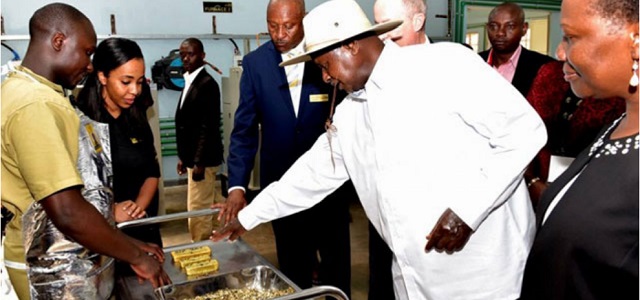
However, Auditor-General John Muwanga report faults the taxman for failing to collect taxes from gold exports
Kampala, Uganda | THE INDEPENDENT | Uganda’s gold exports have seen a dramatic rebound, hitting US$2.3 billion last year following the government’s decision to lower export taxes, a move aimed at revitalizing trade that had been adversely affected for over a year.
The Bank of Uganda’s latest data reveals a significant recovery from the US$300 million recorded in 2022, marking a return to growth for the sector.
In 2020, gold exports had reached US$1.8 billion, surpassing coffee as Uganda’s top export earner for the first time. However, the export figures dipped significantly in 2022 due to high taxation that was imposed in July 2021 sparking a year-long protest from processors and exporters.
However, the government’s strategic tax adjustment last year, from a proposed levy of $200 per kilogram of exported gold to a more manageable $100 or 5% of the value, has been pivotal in this turnaround.
Uganda, traditionally known for its coffee exports which brought in US$965.33 million in 2023, up 46.5% from 2020, exported 38,878 tonnes of gold last year, a substantial increase from the 3,897 tonnes in 2022. This surge has significantly contributed to the country’s total export volumes reaching US$6.98 billion in 2023, up from US$4.2 billion in 2022.
Interestingly, the country’s role as a major conduit for gold, primarily mined in the neighboring Democratic Republic of Congo supplemented with the available low gold local production, has been the critical factor in the export sector.
Uganda exports most of its gold to the Middle East, with the United Arab Emirates being the largest recipient.
This comes as opposition legislators, led by Kira municipality MP Ibrahim Ssemujju Nganda, who also serves as the shadow minister of Finance, raises concerns over the Uganda Revenue Authority’s (URA) failure to effectively collect taxes from the export of refined gold.
In their minority report for the Budget Committee concerning the 2024/25 budget framework, the MPs highlighted a significant gap in the nation’s resource envelope due to uncollected taxes from gold exports.
The report, referencing data from the Auditor General, points out that URA did not collect an estimated Shs 52.2 billion in taxes from the export of 70,837kg of gold.
The legislators argue that the failure to collect these taxes is due to the proximity of individuals involved in gold exports to the president, which allegedly renders their businesses immune to URA’s typical enforcement actions.
Meanwhile, URA has written to airlines operating out of Uganda to reject gold shipments from the country if the exporters do not show proof of clearance of all payments warning that transporting uncustomed gold will be contrary to the East African Community Customs Management, according to The East African.
This follows Auditor-General John Muwanga’s report faulting the taxman for failing to collect taxes from gold exports as gold dealers reap millions of dollars from trading in the precious mineral.
However, URA’s management blamed the low collections on a tax dispute with gold exporters dating back to 2022 following the enactment of a new law imposing high taxes.
Interestingly, it is understood that representatives of the three gold refineries and exporters – Bullion Refinery Ltd, Aurnish Trading Ltd, and Metal Testing Ltd – that previously contested the URA’s tax claims in court and were unsuccessful – engaged in dialogue with the tax authority recently to outline a feasible payment plan.
 The Independent Uganda: You get the Truth we Pay the Price
The Independent Uganda: You get the Truth we Pay the Price



